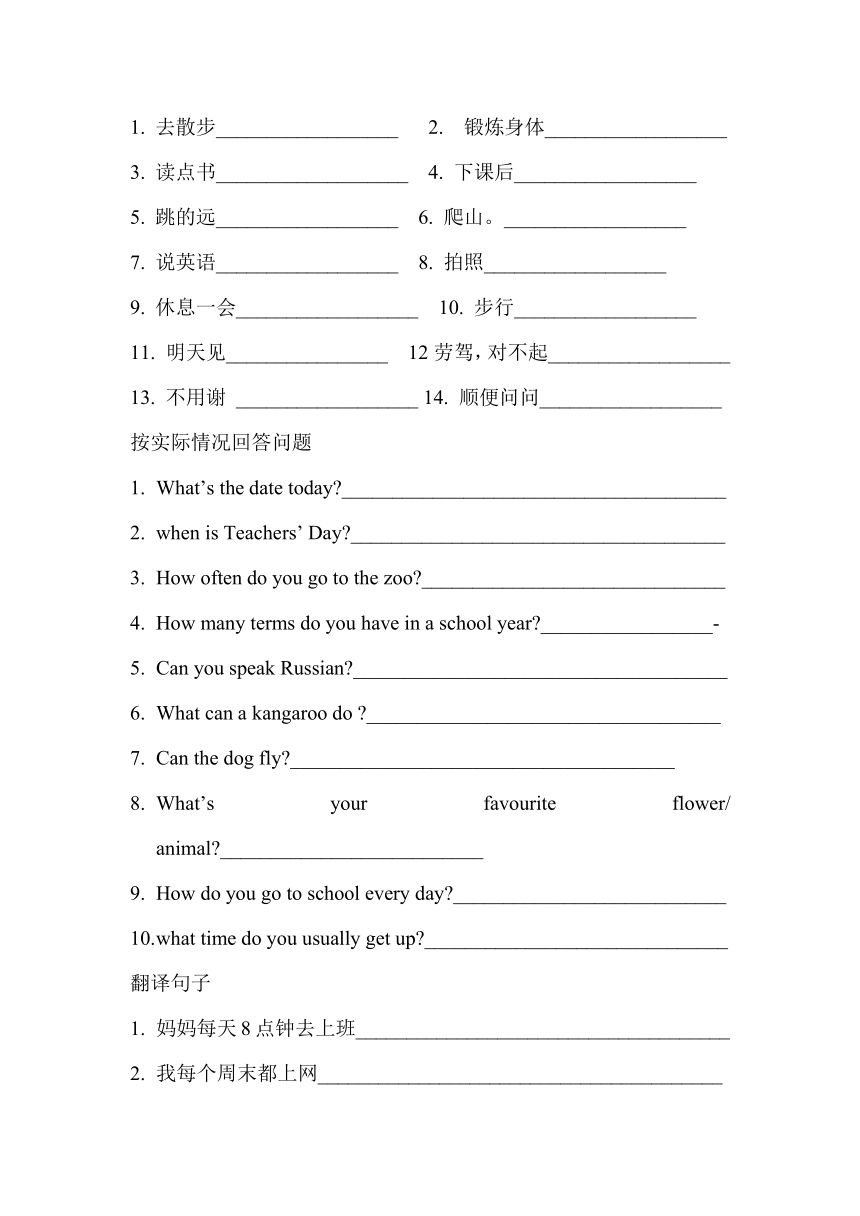广州版小学英语五年级上期末复习资料
图片预览

文档简介
1. 去散步__________________ 2. 锻炼身体__________________
3. 读点书___________________ 4. 下课后__________________
5. 跳的远__________________ 6. 爬山。__________________
7. 说英语__________________ 8. 拍照__________________
9. 休息一会__________________ 10. 步行__________________
11. 明天见________________ 12劳驾,对不起__________________ 13. 不用谢 __________________ 14. 顺便问问__________________
按实际情况回答问题
What’s the date today ______________________________________
when is Teachers’ Day _____________________________________
How often do you go to the zoo ______________________________
How many terms do you have in a school year _________________-
Can you speak Russian _____________________________________
What can a kangaroo do ___________________________________
Can the dog fly ______________________________________
What’s your favourite flower/ animal __________________________
How do you go to school every day ___________________________
what time do you usually get up ______________________________
翻译句子
妈妈每天8点钟去上班_____________________________________
我每个周末都上网________________________________________
我们下课后经常踢足球____________________________________
4我最喜欢的动物是小狗__________________________________
小狗可以跳的很高_______________________________________
我打算去深圳度假_______________________________________
学校里有好多花_________________________________________
_____________ is June 1st
A. Teachers’ Day B. Children’s Day C.Chinese New Year
2. --how often do you go for a walk ---_________
A. At 12:00 B. In the afternoon C. Every weekend
3. Everyone ________ the story.
A. like B. likes C. liking
4. We will go to Window of the World _______ a day trip.
A. in B. on C. for
5._______are you going there ----By bus.
A. How B. where C. when
6. We _________ pick the flowers.
A. don’t B. doesn’t C. mustn’t
7. the robot can tell stories _________ English
A.in B. at C. with
8.the frog can _______but not very high
A. jump B jumping C. jumps
9.she is gong to leave_____ HongKong ______ train.
A. for, by B. to , in C. to , by
3. 读点书___________________ 4. 下课后__________________
5. 跳的远__________________ 6. 爬山。__________________
7. 说英语__________________ 8. 拍照__________________
9. 休息一会__________________ 10. 步行__________________
11. 明天见________________ 12劳驾,对不起__________________ 13. 不用谢 __________________ 14. 顺便问问__________________
按实际情况回答问题
What’s the date today ______________________________________
when is Teachers’ Day _____________________________________
How often do you go to the zoo ______________________________
How many terms do you have in a school year _________________-
Can you speak Russian _____________________________________
What can a kangaroo do ___________________________________
Can the dog fly ______________________________________
What’s your favourite flower/ animal __________________________
How do you go to school every day ___________________________
what time do you usually get up ______________________________
翻译句子
妈妈每天8点钟去上班_____________________________________
我每个周末都上网________________________________________
我们下课后经常踢足球____________________________________
4我最喜欢的动物是小狗__________________________________
小狗可以跳的很高_______________________________________
我打算去深圳度假_______________________________________
学校里有好多花_________________________________________
_____________ is June 1st
A. Teachers’ Day B. Children’s Day C.Chinese New Year
2. --how often do you go for a walk ---_________
A. At 12:00 B. In the afternoon C. Every weekend
3. Everyone ________ the story.
A. like B. likes C. liking
4. We will go to Window of the World _______ a day trip.
A. in B. on C. for
5._______are you going there ----By bus.
A. How B. where C. when
6. We _________ pick the flowers.
A. don’t B. doesn’t C. mustn’t
7. the robot can tell stories _________ English
A.in B. at C. with
8.the frog can _______but not very high
A. jump B jumping C. jumps
9.she is gong to leave_____ HongKong ______ train.
A. for, by B. to , in C. to , by
同课章节目录
- Module 1 Hobbies
- Unit 1 What's your hobby?
- Unit 2 His hobby is drawing
- Module 2 Abilities
- Unit 3 I can swim very fast
- Unit 4 Can you do homework?
- Module 3 Daily life
- Unit 5 Where is Ben?
- Unit 6 At the weekend
- Module 4 Foods and drinks
- Unit 7 Do you want coffee or tea?
- Unit 8 Let's have both
- Module 5 Foods we need
- Unit 9 It smells delicious
- Unit 10 Different tastes
- Module 6 Weathe
- Unit 11 What's the weather like today?
- Unit 12 Four seasons in one day
- Module 7 Let's look back
